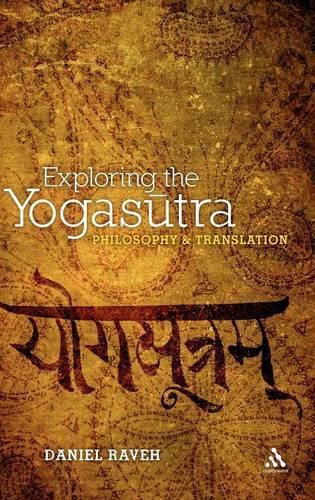
Exploring the Yogasutra: Philosophy and Translation
(Hardback)
Available Formats
Publishing Details
Exploring the Yogasutra: Philosophy and Translation
By (Author) Dr Daniel Raveh
Continuum Publishing Corporation
Continuum Publishing Corporation
8th March 2012
United States
Classifications
Professional and Scholarly
Non Fiction
Hinduism: sacred texts and revered writings
181.452
Physical Properties
Hardback
184
Width 156mm, Height 234mm
Description
Patajali's Yogasutra is an ancient canonic Indian text composed in Sanskrit in the 3rd or 4th century. Belonging to a very different cultural milieu, this multi-layered text is philosophical, psychological and practical in nature. Offering a philosophical reading of Patajali's Yogasutra, this book discusses themes such as freedom, self-identity, time and transcendence, and translation - between languages, cultures and eras. Drawing substantially upon contemporary Indian materials, it discusses for the first time classical yoga as reflected upon by Daya Krishna (1924-2007) with constant reference to Krishna Chandra Bhattacharyya's (1875-1949) studies in yoga philosophy. The genuine attempt on behalf of these two original thinkers to engage philosophically with Patajala-yoga sets the tone of the textual exploration provided here. This book features a new annotated translation of the Yogasutra, and the author provides a useful background to the extensive Samkhya terminology employed by Patajali. Daniel Raveh also offers a close reflection of the very act of translation, and the book concludes with suggestions for further reading and a glossary of central notions.
Reviews
Thinking anew with Patanjali: this is a modern-day translation and meditation on the spiritual praxis and philosophy of the Yogasutras, the great ancient Indian classic. Daniel Raveh's refreshing book is, at the same time, a sensitive reflection on meaningful cross-cultural and cross-epochal translation which he sees as a process of creative transformation, a process inevitable for retaining significance.' -- Dr Mukund Lath, University of Rajasthan, Jaipur, India.
Raveh's thoughtful reflections on the nature of translation, his investigation of five key themes: practice, dispassion, ignorance, clinging, and yogic knowledge, as well as his skilfully rendered new translation of the Yoga Sutra make this book indispensible reading for anyone with a serious interest in the study of classical Yoga.' -- Christopher Key Chapple, Doshi Professor of Indic and Comparative Theology, Loyola Marymount University, USA.
As a philosophical work attempting to answer some questions that Patajali's YS raises, it is a refreshing change from the recent trend of Yoga books dealing mainly with "physical-Yoga".' -- Dr. T.S. Rukmani, Professor and Chair in Hindu Studies, Concordia University, Canada
Exploring the Yogasutra presents a new, engaging perspective on Patanjali from a philosophical point of view. It is a contribution invaluable for anybody interested in this authoritative source of Yoga theory.' -- Dr Yohanan Grinshpon, Department of Comparative Religion, The Hebrew University of Jerusalem, Israel
Raveh undertakes an extraordinary clarification of the old, profound, paradoxical, often mysterious inward-seeking inwardness of the Yogasutra...Altogether, the book is a great didactic success in the translation of the thought and practice of one culture into the terms of another.' -- Ben-Ami Scharfstein, author of A Comparative History of World Philosophy: From the Upanishads to Kant, and Professor Emeritus of Philosophy, Tel-Aviv University, Israel
Author Bio
Daniel Raveh is Lecturer of Indian and Comparative Philosophy at Tel Aviv University, Israel.
